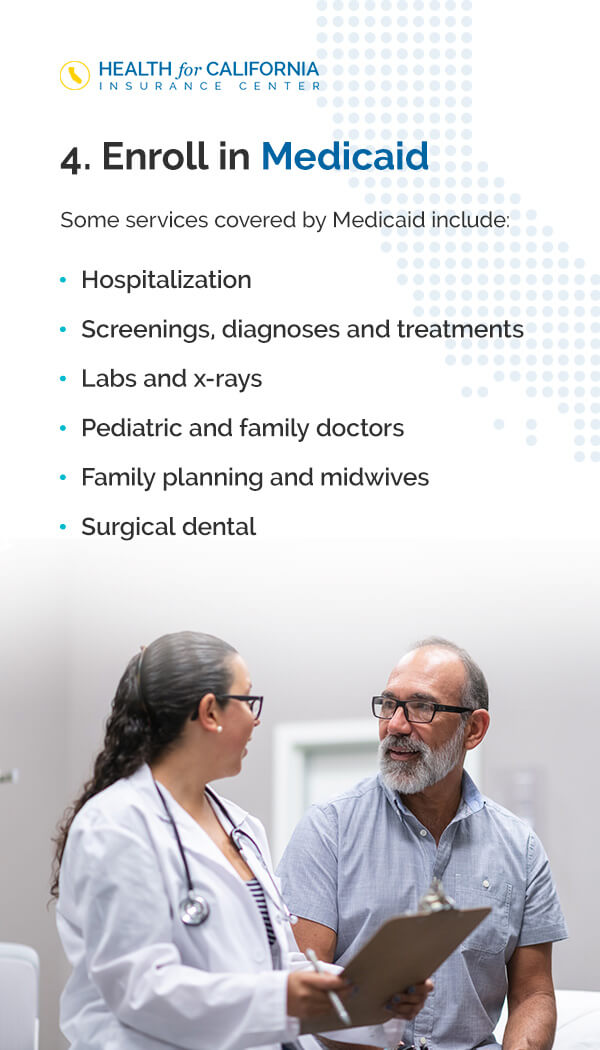How to Get Health Insurance When You’re Unemployed
Posted: July 20, 2022

When you lose your job, you’ll often lose the health insurance benefits that accompany it. Many people are unsure where to start when searching for new health insurance. Understanding your options, eligibility, income and medical needs can give you an excellent place to start.
Why You Need Health Insurance When Unemployed
When living in the U.S. as an unemployed or low-income person, health insurance is necessary to help you avoid taking on expensive medical debt. Around 60-65% of bankruptcies are due to medical expenses.
The cost of vital medical services causes many problems for people who have no health insurance and are unemployed. The average rate for a day in the hospital is over $2,600 nationally, rising to over $3,700 in California. If you need to stay overnight, you can expect costs to reach around $9,300 without insurance.
These costs don’t include life-saving surgeries or procedures, including x-rays, labs or scans. While hospitals can’t reject patients because they’re uninsured, unexpected medical emergencies can create additional stress for people without insurance. Being unemployed can make it more challenging to pay medical bills.
While medical emergencies create significant medical costs for uninsured and unemployed people, high prices can impact everyday medical needs. Without access to affordable health services or health insurance, many adults miss things they need to keep them healthy. In a 2021 study, around 29% of people said they skipped prescription medications because of the cost. Further, high costs caused approximately 39% of adults to go without dental services.
When unemployed, investing in health insurance can help protect your finances while providing you with vital medical services to keep yourself healthy as you search for work.
What Options Are Available for You?
If you need to know how to buy health insurance without a job, you should know that many options are available, so you can find the coverage that works best for you. Especially since many people lose jobs without warning or preparation, understanding your choices can help you relieve stress and ensure you’re ready to make an informed decision about health insurance.
1. Continue Your Employer’s Coverage With COBRA

The Consolidated Omnibus Budget Reconciliation Act (COBRA) can be a good option for people who just became unemployed but would like to keep their health insurance coverage. Under COBRA, you can keep the health insurance plan provided by your employer for up to 18 months, giving you time to find a new plan or job while maintaining protection. The act requires all employers with more than 20 employees to offer this service, and many states have similar laws for smaller businesses.
COBRA insurance can be an excellent option for people who experienced sudden job loss and want to keep the level of protection they had with that employer. However, many people choose other options over this one because it can be more expensive. When you select COBRA as your unemployed health insurance, you’ll have to pay employee and employer premiums with an administration fee. Previously, you’d only have to pay employee premiums, so the price increase can cause many people to look elsewhere for insurance.
If you decide to select this coverage option, you can expect the same benefits and protection. If COBRA seems like a good health insurance option for your and your family, you’ll need to register within 60 days of losing your job.
2. Find New Insurance Plan on State Marketplace
If COBRA isn’t for you, you can find plans and policies that fit your needs and budget by enrolling with a new provider on your state’s insurance marketplace. This method will allow you to explore private insurance carriers and policies to get the coverage you need.
Marketplace providers need to meet the Affordable Care Act’s (ACA) minimum coverage requirements, ensuring more comprehensive and affordable medical insurance for unemployed people. This requirement also means they can’t reject you because of pre-existing health conditions or charge different amounts based on your medical history.
When considering this option, you’ll need to be careful about enrollment periods. Marketplace enrollment only occurs once a year, usually around early November through mid-December. However, you can qualify for a special enrollment period if you have a significant lifestyle change, like losing your coverage, getting married or having a child. This option will let you enroll in insurance outside of the expected timeframe, so you can receive health insurance in the weeks after losing your job.
While Marketplace can help you find more affordable coverage options, you can’t guarantee that you’ll have the same coverage as before. When choosing between COBRA and Marketplace options, you’ll want to consider all factors, from price and income to available benefits and coverage.
3. Join Your Spouse’s Plan
After you lose your job and your spouse has health insurance from their work, you can join their plan as a dependent. This option appeals to many people because they already know everything the policy covers. However, you can experience higher premiums when you add another dependent.
Joining a plan as a dependent can be a great option for families, allowing them to claim and protect their children, as well. Especially since many Marketplace plans depend on income, switching to your spouse’s plan can help you find affordable coverage. Of course, it’s still worth researching other options to ensure you review everything that’s available to you.
4. Enroll in Medicaid

Medicaid is health insurance coverage for people with lower income levels, making it an excellent option for people who have lost their jobs and have decreased or no income. The state and federal governments run Medicaid, so California will have specific income requirements for different plans and coverage levels.
Eligibility for Medicaid will depend on your monthly income, so you can receive health insurance coverage even if you were making larger sums earlier in the year. People enjoy Medicaid because enrollment is always open — you can enroll when you need it, whether that’s just after losing your job, when COBRA benefits run out or because of other lifestyle changes.
Medicaid can also be an excellent option for health insurance for unemployed people because it offers comprehensive benefits. Some services covered by Medicaid include:
- Hospitalization
- Screenings, diagnoses and treatments
- Labs and x-rays
- Pediatric and family doctors
- Family planning and midwives
- Surgical dental
Medicaid can be a flexible option for people with lower incomes who still want good protection. However, be sure to check specific guidelines because they can change annually.
5. Check Medicare Eligibility
The Social Security Association runs Medicare for specific groups of people who qualify for medical benefits and coverage. If you’re eligible, you can enroll in Medicare to receive certain medical benefits and coverage. Unlike Medicaid, enrollment only occurs at specific times and you can expect penalties if you register outside of those times. Further, only family members who qualify can receive coverage under Medicare, so you can’t use it to cover all of your dependents.
Medicare breaks down into different parts, which provide coverage for other medical services:
- Part A: This section covers hospitalization. If you have an emergency and need to go to the hospital, you can still have medical protection when you use part A.
- Part B: Part B will cover more general medical services, like doctor’s appointments. Part B is great for people who might want less coverage or don’t need hospital protection.
- Part C: Also called the Advantage Plan, Part C is a more comprehensive plan that includes Parts A and B with additional coverage, like drug costs. Some plans under Part C can include vision and dental.
- Part D: Part D is specifically for prescription drugs.
You can enroll in Medicare and Medicaid if you qualify for both, allowing you to receive more benefits. Medigap is another program that helps cover the gaps in Medicare coverage, like copays, deductibles and coinsurance. You can purchase a Medigap plan through private insurance providers, but you can’t have Medigap and Part C. Because both aim to offer more comprehensive coverage and protection, you’ll need to choose between them to determine which will better serve you.
Who’s Eligible for Unemployed Health Insurance?
While each health insurance option has unique benefits and challenges, you’ll also need to know if you qualify for the one you want. Knowing what you’re eligible for can limit your options to only the most relevant choices, simplifying your search.
1. COBRA
To qualify for COBRA, you need to have lost your job within the last 60 days. However, you can use COBRA if your employer fires you or you voluntarily leave your job without another one lined up — you have more freedom surrounding the circumstances of your unemployment.
Because COBRA keeps the same coverage as when you were employed, you can use it to support children and other dependents, as well.
2. Marketplace
While the ACA helps protect people from medical discrimination when choosing an insurance provider, Marketplace policies and providers might have other requirements for eligibility. For example, some carriers only provide coverage in specific states or geographic regions, so you’ll need to find one that offers protection where you live.
You may also qualify for tax subsidies depending on your income or family size. These benefits can help make higher premiums more affordable, so you can continue to receive medical protection while supporting your family at a price that works for you. Each insurance provider and the state has specific requirements for subsidies, but it’s something you can consider as you research plans on Marketplace.
3. Spouse

When determining if you can switch to your spouse’s plan, the main factor is whether the plan allows them to claim dependents. If their policy lets them claim you and any children as dependents, you can use their plan for coverage.
4. Medicaid
Like Marketplace providers, Medicaid policies have no medical discrimination, allowing people to qualify for it based on medical history. However, Medicaid serves as medical insurance for low-income individuals and families, so there will be income requirements you need to meet to qualify.
State governments establish the income requirements, so some might have higher or lower qualifications than others. Understanding California’s income eligibility can help you determine whether Medicaid might be a good fit for you and your family.
5. Medicare
Medicare has precise eligibility requirements. You can qualify for Medicare coverage if you meet the following conditions:
- Age: Everyone over the age of 65 qualifies for Medicare, though you can only register at a specific time to avoid getting penalized. You can enroll up to three months before you turn 65. This insurance policy is primarily for retired people, so if you stopped working to enter retirement, Medicare might be the right option for you.
- Illness: People under 65 can also qualify for Medicare coverage if they have certain conditions like end-stage renal disease or amyotrophic lateral sclerosis (ALS).
- Disability: If you have a disability that allows you to receive Social Security benefits before you turn 65, you can also qualify for Medicare.
You can’t form a family plan or insure dependents with a Medicare health insurance policy. However, it’s an excellent option for people trying to figure out how to get health insurance without a job if they meet special requirements.
Covered California for Unemployed People
The Covered California Health Exchange is an agency that helps connect California residents with affordable health insurance policies that meet ACA standards for minimum coverage, like prescription drug costs and preventative medical services. Covered California is an excellent solution for unemployed or low-income individuals because it helps you find subsidies and discounts to reduce premiums and medical costs.
Like many other insurance purchasing options, Covered California has open enrollment periods once a year. However, you can qualify for a particular enrollment period if you have a life-changing event, like losing your insurance due to unemployment.
Explore Health Insurance Policies With Health for California
While becoming unemployed can be stressful for individuals and families, having comprehensive health insurance that protects you and your dependents can help reduce the financial strain of paying out of pocket for medical services. However, you can also partner with organizations like Health for California, which understand everything about the health insurance application and enrollment process.
We work with you to find a health insurance policy that meets your medical and financial needs. Our process and app are easy-to-use, intuitive, accurate and free. With agents who are experts in the field, we can provide you with the personalized care you need and can answer all questions you might have — completely free of charge.
Request a free quote from Health for California today!
